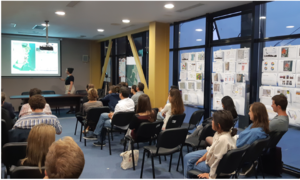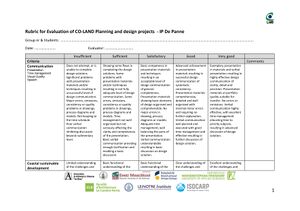Assessment: Difference between revisions
Olaf.schroth (talk | contribs) No edit summary |
Olaf.schroth (talk | contribs) No edit summary |
||
| (8 intermediate revisions by the same user not shown) | |||
| Line 1: | Line 1: | ||
>>> [[Output_2_-_Toolbox|Back to tool-box overview]] | >>> [[Output_2_-_Toolbox|Back to tool-box overview]] | ||
{| class="wikitable" | |||
|- | |||
| '''Executive Summary Step 7: Assessment''' | |||
|- | |||
| While feedback is a continuous process throughout the course, the overall performance is usually assessed through grading. The following section is giving support on this part of the process. | |||
|} | |||
[[File:Public presentation.PNG|thumb|right|Assessment criteria for the ‘Spatial concept’ and ‘Communication’ parts]] | |||
Part of the examination is also an oral online presentation after each thematic section of the seminar. Each team member is required to speak and present one slide or more. Approximately four working groups are formed and together with the teachers and tutors, the working groups also form the presentation audience. The presentation is moderated and discussed within the working groups, evaluated by the teachers and tutors using a feedback form without grading (see the Rubric Template below), and the result is reported back to the four working groups in a timely manner. At the end of the seminar, the international teams also need to reflect on their collaboration process and document their findings). The completed case study provided using the wiki template is evaluated and graded according to the following criteria:<br> | |||
Part of the examination is also an oral online presentation after each thematic section of the seminar | |||
moderated and discussed within the working groups, evaluated by the teachers and tutors using a feedback | |||
form without grading (see | |||
* Comprehensiveness and depth of the research in general (in particular assignment A) | * Comprehensiveness and depth of the research in general (in particular assignment A) | ||
| Line 31: | Line 21: | ||
Students who actively take part in both the online seminar and the intensive study programme (ISP) workshop have the opportunity to take the graded assignment there. In this case, the focus is on strategic and spatial planning and the assessment criteria differ slightly. | Students who actively take part in both the online seminar and the intensive study programme (ISP) workshop have the opportunity to take the graded assignment there. In this case, the focus is on strategic and spatial planning and the assessment criteria differ slightly. | ||
== Rubric Template == | |||
Please use the following [[rubric templates]] for the assessment of student work in the COLAND intensive programmes. | Please feel free to use the following [[rubric templates]] for the assessment of student work in the COLAND intensive programmes. | ||
[https://www.hswt.de/fileadmin/Dateien/Hochschule/Fakultaeten/LA/LIZ/Rubric-for-Evaluation-of-CO-LAND-Student-Work-Project-IP-De-Panne.docx Download the template for your own use (Creative Commons license)] | [https://www.hswt.de/fileadmin/Dateien/Hochschule/Fakultaeten/LA/LIZ/Rubric-for-Evaluation-of-CO-LAND-Student-Work-Project-IP-De-Panne.docx Download the template for your own use (Creative Commons license)] | ||
[[File:Rubric for Evaluation of CO-LAND Student Work Project IP De Panne Seite 1.jpg|thumb|none]] | [[File:Rubric for Evaluation of CO-LAND Student Work Project IP De Panne Seite 1.jpg|thumb|none]] | ||
== Converting grades across different higher education systems == | |||
The [[ECTS]] credit system has been harmonized across Europe but the diversity of grading systems poses a major challenge to facilitating European student exchange. The following table is providing a general overview of ECTS grades, but these still have to be translated into your local grading system. Please contact your local Erasmus+ coordinators for specific support and information. | |||
{| class="wikitable" | |||
|- | |||
! ECTS Grading Scale !! Definition | |||
|- | |||
| A || excellent | |||
|- | |||
| B || very good | |||
|- | |||
| C || good | |||
|- | |||
| D || satisfactory | |||
|- | |||
| E || sufficient | |||
|- | |||
| FX || fail | |||
|- | |||
| F || fail | |||
|} | |||
== Further Reading == | |||
* [https://feedbackhandbook.files.wordpress.com/2011/12/feedback-handbook-web-version-2012.pdf School of Architecture (2012). The Feedback Handbook. University of Sheffield: Sheffield.] | |||
Latest revision as of 15:48, 5 January 2021
| Executive Summary Step 7: Assessment |
| While feedback is a continuous process throughout the course, the overall performance is usually assessed through grading. The following section is giving support on this part of the process. |
Part of the examination is also an oral online presentation after each thematic section of the seminar. Each team member is required to speak and present one slide or more. Approximately four working groups are formed and together with the teachers and tutors, the working groups also form the presentation audience. The presentation is moderated and discussed within the working groups, evaluated by the teachers and tutors using a feedback form without grading (see the Rubric Template below), and the result is reported back to the four working groups in a timely manner. At the end of the seminar, the international teams also need to reflect on their collaboration process and document their findings). The completed case study provided using the wiki template is evaluated and graded according to the following criteria:
- Comprehensiveness and depth of the research in general (in particular assignment A)
- Methodological conclusiveness and clarity (in particular assignment B)
- Consistency in the formulation of strategy and objectives as well as persuasiveness and creativity
- in spatial (landscape) vision and implementation ideas (in particular assignment C)
- Profoundness and seriousness in the process (assignment D)
- Competence in textual and graphic expression, visual appearance of graphics and maps
- Scientific quality of the elaboration, source work, citation method etc.
Students who actively take part in both the online seminar and the intensive study programme (ISP) workshop have the opportunity to take the graded assignment there. In this case, the focus is on strategic and spatial planning and the assessment criteria differ slightly.
Rubric Template
Please feel free to use the following rubric templates for the assessment of student work in the COLAND intensive programmes.
Download the template for your own use (Creative Commons license)
Converting grades across different higher education systems
The ECTS credit system has been harmonized across Europe but the diversity of grading systems poses a major challenge to facilitating European student exchange. The following table is providing a general overview of ECTS grades, but these still have to be translated into your local grading system. Please contact your local Erasmus+ coordinators for specific support and information.
| ECTS Grading Scale | Definition |
|---|---|
| A | excellent |
| B | very good |
| C | good |
| D | satisfactory |
| E | sufficient |
| FX | fail |
| F | fail |

